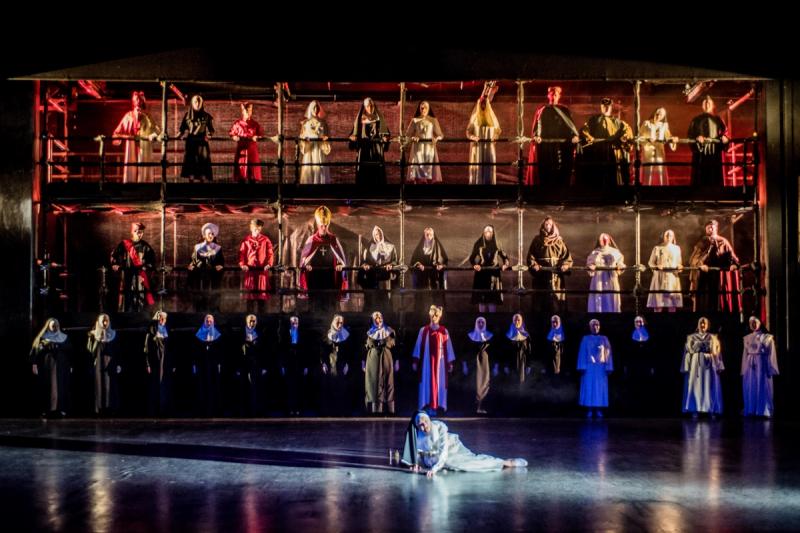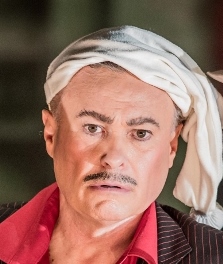Gianni Schicchi/Suor Angelica, RNCM, Manchester review – music does the magic | reviews, news & interviews
Gianni Schicchi/Suor Angelica, RNCM, Manchester review – music does the magic
Gianni Schicchi/Suor Angelica, RNCM, Manchester review – music does the magic
A new and impressive approach to college opera performance

The Royal Northern College of Music’s December opera production was the useful double bill of Suor Angelica and Gianni Schicchi from Puccini’s Trittico.
This time there was the difference that the eponymous characters were sung by RNCM artists in residence Linda Richardson and Quentin Hayes – a first, as far as I’m aware, and one that gave poise and expertise to both productions. Helping students gain experience at professional level is the point, and you could see that happening before your very eyes. (Some of the roles were double cast, as alternating performances is now the RNCM’s normal practice, but some individuals had roles in both pieces).
With Martin Andre conducting and Kevin Thraves chorus master, musical standards were very high indeed – occasional wobbles of ensemble in the orchestra pit, but also some beautiful, expressive and atmospheric playing from strings and wind alike.
The productions by Robert Chevara (sets by Nicolai Hart-Hansen, lighting by Ian Sommerville) were impressive – in particular the costuming and three-storey edifice for the closing choral scene of Suor Angelica, when saints and scholars from the past welcome the tragic nun to heaven. I wasn’t 100 per cent sure about the idea of having members of the convent arrive "late" for chapel in the opening scene – that can be a bit too Sound of Music if you’re not careful – and it will always be a challenge for a director to come up with something uncringeworthy to represent the heroine’s miraculous visions, but those were minor issues and the ending was powerful and effective.
 The centre of the piece, though, is a confrontation between Suor Angelica and her aunt, the Principessa. Here we realised, for the first time, that the production is set in a time slot about 60 years ago. A formica-top table is there for the Principessa to use as she does her niece out of both her legal inheritance and her one and only hope – that her illegitimate son might have survived and yet be happy. (The table’s there in Gianni Schicchi as well, keeping the two operas in time-sync).
The centre of the piece, though, is a confrontation between Suor Angelica and her aunt, the Principessa. Here we realised, for the first time, that the production is set in a time slot about 60 years ago. A formica-top table is there for the Principessa to use as she does her niece out of both her legal inheritance and her one and only hope – that her illegitimate son might have survived and yet be happy. (The table’s there in Gianni Schicchi as well, keeping the two operas in time-sync).
And the Principessa is a hard-faced, blonde meanie – skilfully played and wonderfully sung by mezzo Stephanie Maitland on the night I saw the programme. There is surely a very big talent here, as she switched roles with aplomb to be an amusingly truculent Zita in Gianni Schicchi, too, and her rich voice timbre through a remarkable range is something very special. There could have been a problem for her to seem a mature woman opposite Linda Richardson’s generation-younger character, but it hardly crossed one’s mind.
I also noticed Olivia Carrell’s sparkly performance as one of the Cercatrici, and the imperious Maestra delle Novizie as played by Lucy Vallis (a singer of much ability already witnessed at the RNCM, and here singing Ciesca in Gianni Schicchi also).
The comedy itself was done as a comedy should be – for laughs. Chevara’s production values were spot on for this one, and Quentin Hayes (pictured above) was the right man for a slightly clownish, but still knowing, performance of the title role. We were in much the same period as for the previous tale, i.e. relatively modernised, and Schicchi had become a smart, smooth Italian go-to guy for dodgy dealings (as you would need for impersonating a testator, of course). The other characters are all necessarily subservient, but the young lovers Rinuccio and Lauretta were very well sung by the artists I saw: Yuliya Shvarko bringing affecting simplicity to her "O mio babbino caro", and Iain Henderson showing himself to have a fine and matured tenor voice.
The poser in any performance of Gianni Schicchi, it seems to me, is that the bare scenario on its own has to be totally implausible – even presented as comedy. Why should the greedy relatives of a dead man trust someone they know to be a crook to fix things in their favour, and not (as finally turns out to be the case) also in his own? Why should we – even in a comedy – treat this as believable? Puccini and Forzano knew how to make it work, and that’s why you get the much orchestrally trailed show-stopping aria from Schicchi’s daughter (beloved of every Classic FM listener, despite being in fact about suicide) at the crucial point. Music does the magic, at least to make the audience suspend its disbelief.
But surely there has to be some sign that Lauretta, Rinuccio and Schicchi are all in this together – a glance, a wink, a nudge? It’s a send-up of romantic innocence, not the real thing.
rating
Explore topics
Share this article
The future of Arts Journalism
You can stop theartsdesk.com closing!
We urgently need financing to survive. Our fundraising drive has thus far raised £49,000 but we need to reach £100,000 or we will be forced to close. Please contribute here: https://gofund.me/c3f6033d
And if you can forward this information to anyone who might assist, we’d be grateful.

Subscribe to theartsdesk.com
Thank you for continuing to read our work on theartsdesk.com. For unlimited access to every article in its entirety, including our archive of more than 15,000 pieces, we're asking for £5 per month or £40 per year. We feel it's a very good deal, and hope you do too.
To take a subscription now simply click here.
And if you're looking for that extra gift for a friend or family member, why not treat them to a theartsdesk.com gift subscription?
more Opera
 Ariodante, Opéra Garnier, Paris review - a blast of Baroque beauty
A near-perfect night at the opera
Ariodante, Opéra Garnier, Paris review - a blast of Baroque beauty
A near-perfect night at the opera
 Cinderella/La Cenerentola, English National Opera review - the truth behind the tinsel
Appealing performances cut through hyperactive stagecraft
Cinderella/La Cenerentola, English National Opera review - the truth behind the tinsel
Appealing performances cut through hyperactive stagecraft
 Tosca, Royal Opera review - Ailyn Pérez steps in as the most vivid of divas
Jakub Hrůša’s multicoloured Puccini last night found a soprano to match
Tosca, Royal Opera review - Ailyn Pérez steps in as the most vivid of divas
Jakub Hrůša’s multicoloured Puccini last night found a soprano to match
 Tosca, Welsh National Opera review - a great company reduced to brilliance
The old warhorse made special by the basics
Tosca, Welsh National Opera review - a great company reduced to brilliance
The old warhorse made special by the basics
 BBC Proms: The Marriage of Figaro, Glyndebourne Festival review - merriment and menace
Strong Proms transfer for a robust and affecting show
BBC Proms: The Marriage of Figaro, Glyndebourne Festival review - merriment and menace
Strong Proms transfer for a robust and affecting show
 BBC Proms: Suor Angelica, LSO, Pappano review - earthly passion, heavenly grief
A Sister to remember blesses Puccini's convent tragedy
BBC Proms: Suor Angelica, LSO, Pappano review - earthly passion, heavenly grief
A Sister to remember blesses Puccini's convent tragedy
 Orpheus and Eurydice, Opera Queensland/SCO, Edinburgh International Festival 2025 review - dazzling, but distracting
Eye-popping acrobatics don’t always assist in Gluck’s quest for operatic truth
Orpheus and Eurydice, Opera Queensland/SCO, Edinburgh International Festival 2025 review - dazzling, but distracting
Eye-popping acrobatics don’t always assist in Gluck’s quest for operatic truth
 MARS, Irish National Opera review - silly space oddity with fun stretches
Cast, orchestra and production give Jennifer Walshe’s bold collage their all
MARS, Irish National Opera review - silly space oddity with fun stretches
Cast, orchestra and production give Jennifer Walshe’s bold collage their all
 Káťa Kabanová, Glyndebourne review - emotional concentration in a salle modulable
Janáček superbly done through or in spite of the symbolism
Káťa Kabanová, Glyndebourne review - emotional concentration in a salle modulable
Janáček superbly done through or in spite of the symbolism
 Buxton International Festival 2025 review - a lavish offering of smaller-scale work
Allison Cook stands out in a fascinating integrated double bill of Bernstein and Poulenc
Buxton International Festival 2025 review - a lavish offering of smaller-scale work
Allison Cook stands out in a fascinating integrated double bill of Bernstein and Poulenc
 Tosca, Clonter Opera review - beauty and integrity in miniature
Happy surprises and a convincing interpretation of Puccini for today
Tosca, Clonter Opera review - beauty and integrity in miniature
Happy surprises and a convincing interpretation of Puccini for today
 Hamlet, Buxton International Festival review - how to re-imagine re-imagined Shakespeare
Music comes first in very 19th century, very Romantic, very French operatic creation
Hamlet, Buxton International Festival review - how to re-imagine re-imagined Shakespeare
Music comes first in very 19th century, very Romantic, very French operatic creation

Add comment